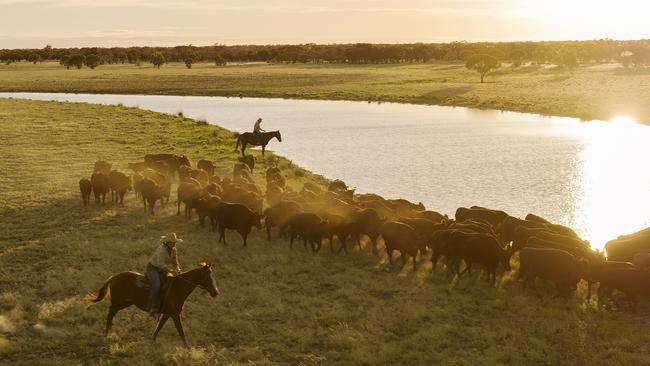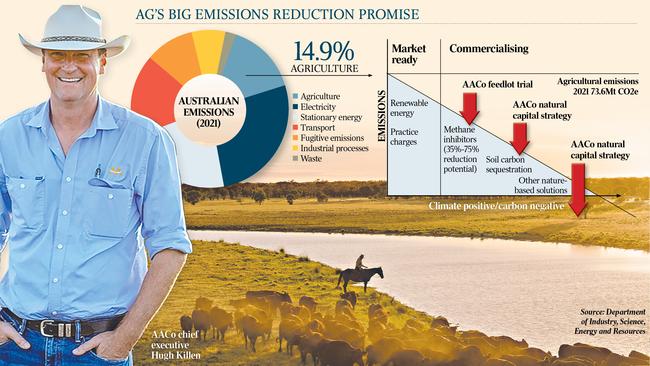Cattle operator AACo’s grand plan to be climate positive
Australia’s oldest and largest cattle company AACo plans to be a net positive force in the battle against climate change.

Australia’s oldest and largest cattle company AACo plans to be a net positive force in the battle against climate change. Quite an aspiration given the global anti-farming campaigns on the cost of millions of farting cattle.
On Thursday CEO Hugh Killen launches a bold blueprint on climate action, nature regeneration and animal welfare.
Spare a thought for cattle producers. Australia is a land of drought and flooding rain and pressure to reduce greenhouse gas. And over the last five years, in that order.
AACo is the owner of 1 per cent of the Australian land mass on which its cattle roam. Killen is acutely aware that, on one side, AACo sits in the crosshairs over methane emissions and on the other its vast territory is also part of the solution to lowering carbon emissions.
“We are operating in an environment now where our customers, our financiers, all of our stakeholders and society are demanding more of an idea of how their food providers are thinking,” says Killen.
“The opportunity for us to lean into the conversation around sustainability is now.
“There is a lot of talk going on and pockets of significant action, but it is time for AACo and some of the larger players in the industry to work out what the pathway towards climate positive.”
To be clear, Killen is not setting a target, even though the Meat & Livestock Association already has a rather ambitious one to be greenhouse gas neutral by 2030. He supports the MLA for having something to run at but whether it gets there is another matter.
For Killen it must be action before targets. “There is a lot of emerging science and we would like to be involved in ground-truthing some of that science. There’s a lot of politics. It is easy to put up targets with some caveats. I prefer not to do that. I’d rather say we need some more information, we will bear some of the heavy lifting. When we have done that we will set the target.”
AACo’s blueprint has five priority commitments. Grabbing most attention will be work on cattle methane emissions (which are largely from burping not from the other end).
According to CSIRO methane is 28 times more powerful that carbon dioxide. Livestock production accounts for about 15 per cent of greenhouse gas emissions and in Australia about 10 per cent of national emissions.
In a new joint venture with Sea Forest, the MLA and the University of New England, AACo aims to fast track the commercialisation of the seaweed additive Asparagopsis for the cattle diet.

Killen says the science around the red seaweed’s ability to abate methane is proven. AACo will now run the first industry trial on 80 feedlot Wagyu cattle. These animals are run over two years on pasture and then have 300 days in the feedlot. If successful, it could be ground breaking for emissions.
The trial will look at animal health, meat quality and productivity. “We think it will aid the efficiency of the rumen which is why we think we are going to get a productivity benefit.”
In recent years, Killen has recast AACo as the high quality brand in global markets. The Sea Forest partnership fits well. “They are repurposing an existing mussel farm and infrastructure in the sea in Tasmania and from a sustainability standpoint that sounds good. And we can use an endemic product to Australia within our supply chain.”
Killen will start in the feedlot as he muses on how to get the product to cattle out on the rangelands. There are also questions around cost and scaling up the seaweed. AACo’s premium product commands a high price per kilo which will help, but so will scale.
“We believe Sea Forest can do it but we are going to need others to come into the industry and commercialise Asparagopsis to a much greater scale. It is not until businesses like AACo get involved that there is impetus for scaling.”
And Killen believes other additives will come onto the market.
A new Wylarah Institute backed by $500,000 a year from AACo will support the rapid adoption and commercialisation of late stage science. Killen says it will have an independent board and AACo offer itself as a testing ground to incubate science within a live environment or a supply chain and help mentor scientists and entrepreneurs.
“People will test and learn within AACo which is a very difficult thing to get access to. It is hard to compete to get space in these trials.”
The idea is to reimagine agriculture and landscape use beyond food and AACo has some big targets for regeneration. By 2030, it commits to achieve over 50 per cent of persistent ground cover for 90 per cent of its savannah tropics land and 80 per cent of grasslands. By 2024, the shift from diesel to solar across its network of bores will be complete and station complexes will be solar powered.
Where AACo’s work may be most valuable is in carbon soil sequestration. This is the great hope for global emissions reduction but sequestration falls badly short in how to measure the benefits accurately, which is critical to a carbon credits system.
The company is working with Food Agility and others to pioneer a method for estimating and forecasting soil carbon by satellite. If it succeeds Killen says it will bring down the cost barrier for participation in emerging soil carbon trading markets for farmers.
“And that is a big deal. If we were going to use soil carbon tests across our 6.4 million hectares it would cost $128m a year, so there is no way you can get the methodology right without changing the way we measure it. This is exactly where we want to play.”
Using this new tool, AACo wants to demonstrate the full biogenic carbon cycle in action through the estate: carbon sequestration in vegetation and methane emissions from cattle.
Also part of the blueprint, biodiversity and natural capital will be measured and certified in a framework developed with Accounting for Nature which will report on AACo’s assets by 2023. Killen says accreditation should bring opportunity for finance and green credits and set a pathway to becoming climate positive.
New certification for animal health and welfare is the final piece in the strategy. Killen says that Australia’s high standards lead the world (compare for example Europe’s high intensity farming). Yet there is a gap in certification for the northern Australian rangelands which he aims to rectify by 2024. “Certification opens markets, commands prices premiums and provides a framework to drive improvements in practices,” he says.
All up there are targets and deadlines. But Hugh Killen is unapologetic on holding off a carbon neutral target.
Killen himself is neutral about Australia opting not join 100 other nations at COP26 which pledged a 30 per cent cut in the country’s methane emissions by 2030.
“We focus on the things we can do and are doing. We are well on track around programs registered today,” he says. “If we get this right, making real commitments to progressing the science and operationalisation, we get the opportunity to do the right thing by the environment and have profitable businesses. That’s a good place to invest.”
AACo’s half-year result on Monday delivered a fifth consecutive quarter of positive cash flow. Killen says the herd is rebuilding after drought and floods and the stock is up 54 per cent this year.
“It’s a really good time to be in the beef industry, irrespective of what some of the press says. The consumption of high quality red meat only continues to go up and our brands are working really well in market. When you tie it back to sustainability, those two go hand-in-hand and hopefully that underpins us going forward.”





To join the conversation, please log in. Don't have an account? Register
Join the conversation, you are commenting as Logout